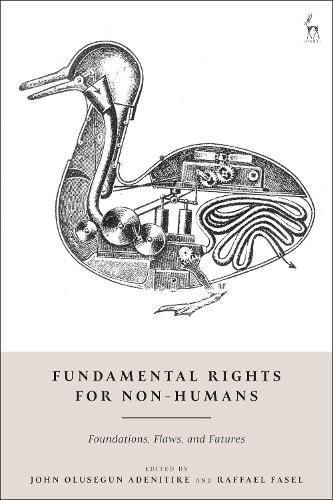Readings Newsletter
Become a Readings Member to make your shopping experience even easier.
Sign in or sign up for free!
You’re not far away from qualifying for FREE standard shipping within Australia
You’ve qualified for FREE standard shipping within Australia
The cart is loading…






Can animals, artificial intelligences (AI), and nature have fundamental rights? Do they have fundamental rights? And if they do, how do their rights relate to human rights?
In this book, eminent and emerging scholars from fields as varied as legal theory, environmental studies, and philosophy, probe the theoretical foundations, flaws, and future prospects of the growing phenomenon of non-human rights.
Using a dialogical structure, the book consists of matched chapters, with one contributor advancing a view on fundamental rights and another engaging with it. This allows readers to deepen their understanding of the different perspectives offered and to participate in constructive conversations that tease out the promise and pitfalls of each position.
This balanced approach makes the book particularly helpful to scholars and students who are seeking insights into the emerging field of fundamental rights for non-humans. The book also benefits theoretically-minded lawyers, judges, and policymakers who are considering the foundational issues that shape the development of animal rights, AI rights, and rights of nature.
$9.00 standard shipping within Australia
FREE standard shipping within Australia for orders over $100.00
Express & International shipping calculated at checkout
Stock availability can be subject to change without notice. We recommend calling the shop or contacting our online team to check availability of low stock items. Please see our Shopping Online page for more details.
Can animals, artificial intelligences (AI), and nature have fundamental rights? Do they have fundamental rights? And if they do, how do their rights relate to human rights?
In this book, eminent and emerging scholars from fields as varied as legal theory, environmental studies, and philosophy, probe the theoretical foundations, flaws, and future prospects of the growing phenomenon of non-human rights.
Using a dialogical structure, the book consists of matched chapters, with one contributor advancing a view on fundamental rights and another engaging with it. This allows readers to deepen their understanding of the different perspectives offered and to participate in constructive conversations that tease out the promise and pitfalls of each position.
This balanced approach makes the book particularly helpful to scholars and students who are seeking insights into the emerging field of fundamental rights for non-humans. The book also benefits theoretically-minded lawyers, judges, and policymakers who are considering the foundational issues that shape the development of animal rights, AI rights, and rights of nature.